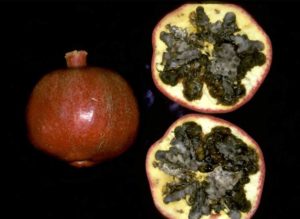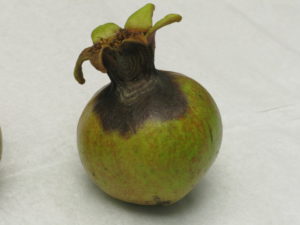Merivon approved for use on pomegranate. Label to be released in California and Florida in 2022.
The production of pomegranates is increasing globally. While India is the largest producer of this fruit, the pomegranate shrub or tree can be grown in any tropical to temperate climate. In the United States, approximately 90 percent of commercially grown pomegranates are produced in California.
Historically, no fungicides were available to growers specifically for use on pomegranates. Thanks to research funded by the IR-4 Project, pomegranate growers in California and Florida will soon be able to use Fluxapyroxad + Pyraclostrobin, manufactured by BASF and sold as Merivon® Xemium® Brand Fungicide, to reduce disease on this popular fruit.
Domestic Production and Disease
California pomegranate growers have mostly favorable weather conditions to grow their crops; however, they still face diseases such as black heart and Botrytis gray mold.

“The main pathogens that infest pomegranate are Alternaria spp., including A. alternata and other Alternaria species that are mainly responsible for black heart in the fruit,” said Dr. Themis Michailides, plant pathologist at the University of California Division of Agriculture and Natural Resources, Kearney Agricultural Research and Extension Center. “Other pathogens that can cause problems include Aspergillus niger and Botrytis cinerea.”
In the southeast, commercial pomegranate production is not common due to fungal disease that can spread easily in the local climate, such as Anthracnose, which causes fruit rot. However, home gardeners in Florida have grown pomegranate trees in their yards for years.
Identifying a Solution
With funding from the IR-4 Project, Michailides conducted successful trials to study the effectiveness of Merivon on controlling pomegranate black heart caused by Alternaria.
The trials took place at the Kearney Agricultural Research and Extension Center and at Wonderful Orchards, a commercial pomegranate grower in Shafter California that has been a supporter of research on this crop.
“Although California doesn’t have an organized pomegranate grower association, we had requests from other growers who were interested in controlling black heart disease. Wonderful Orchards was very cooperative and provided the sprayer to apply the fungicide for the studies,” said Michailides.

In Florida, Dr. Gary Vallad, professor of plant pathology at the University of Florida, conducted trials at grower locations where trees had grown for several years before they produced sufficient fruit. Merivon proved to be effective in controlling Anthracnose in these trials.
Data collected in these studies ultimately led to the U.S. Environmental Protection Agency approving Merivon for use on pomegranates in July of 2021. BASF expects to release the updated label for use in California in time for the 2022 growing season, pending approval from the California Department of Pesticide Registration. BASF is also submitting the label for use in Florida in 2022. Users should ensure that the product is registered for use on pomegranates in their state before proceeding with application.
About the IR-4 Project
The mission of the IR-4 Project is to facilitate regulatory approval of sustainable pest management technologies for specialty crops and specialty uses to promote public well-being. By working directly with local crop growers across the country, IR-4 conducts research and develops data necessary for the registration of pest management tools, ensuring that they are safe for use. To learn more, visit our website at ir4project.org.
